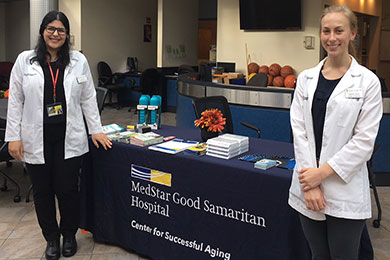No matter where you stand on the health care debate, certain statistics don't lie, but inform.
 Namely, in 2014, older adults (persons 65 years of age and older) represented 14.5 percent of the population, or 46.2 million people. That figure is estimated to jump to 98 million, or 21.7 percent of the U.S. population, by 2040, according to the U.S. Department of Health and Human Services' Administration on Aging. Considering the increase, the complicated issues of older adults and medication use and safety are of paramount importance.
Namely, in 2014, older adults (persons 65 years of age and older) represented 14.5 percent of the population, or 46.2 million people. That figure is estimated to jump to 98 million, or 21.7 percent of the U.S. population, by 2040, according to the U.S. Department of Health and Human Services' Administration on Aging. Considering the increase, the complicated issues of older adults and medication use and safety are of paramount importance.
The University of Maryland School of Pharmacy is poised to tackle the challenge. In fact, it has already started, with the recent help of an anonymous donor.
In 1963, Peter P. Lamy, PhD, ScD, joined the faculty at the School of Pharmacy. This beloved professor and researcher, who pioneered geriatric pharmacotherapy, established the Center for the Study of Pharmacy and Therapeutics for the Elderly, the first of its kind in a pharmacy school. Later renamed in 1994, in honor of Lamy after his death, the goal of the Peter Lamy Center on Drug Therapy and Aging is to improve drug therapy for aging adults through research, education, and clinical initiatives.
Today, Nicole J. Brandt, PharmD '97, MBA, BCPP, CGP, FASCP, is the executive director of the Lamy Center and a professor in the Department of Practice, Sciences, and Health Outcomes Research. The Lamy Center is still one of the few of its kind in the country to be housed in a school of pharmacy. Its leadership team is composed of professors in the fields of pharmacy practice and science, pharmaceutical health services research, and geriatric pharmacotherapy.
Inspired by the Lamy Center's goals and reputation, an alumnus from the School of Pharmacy, who wishes to remain anonymous, recently donated $160,000 to the center. The gift will enable the Lamy Center to implement and evaluate pharmacists' services provided at the Center for Successful Aging at MedStar Good Samaritan Hospital, where pharmacists will focus on transitions of care (coordination of health care when patients move between different medical settings) and high-risk medication use in older adults by collaborating with an interprofessional team.
The donor specifically chose to present this gift to the Lamy Center because "Dr. Brandt is well-established, highly competent and experienced, and will drive the initiative and research forward."
"The goal of this initiative is to improve medication safety and use in older adults with multiple medical co-morbidities and medications," says Brandt, who with her trainees in geriatric pharmacological therapy already has been implementing clinical services at the Center for Successful Aging since February 2017.
According to Brandt, the anonymous gift also is significant because it has created a new collaborative partner whose goals align with those of the Lamy Center. She adds that gifts to the Lamy Center and School of Pharmacy provide critical funds to develop creative programs that train the future workforce to meet the needs of our society, as well as expand the role of pharmacists in caring for older adults in various practice settings.
"There is so much more work to be done, and funding is crucial," she says.
Meanwhile, referring to the anonymous School of Pharmacy alum, Brandt notes that "the donor is a compassionate, caring, and visionary practitioner who personally and professionally understands the importance of pharmacists' involvement in caring for older adults."
